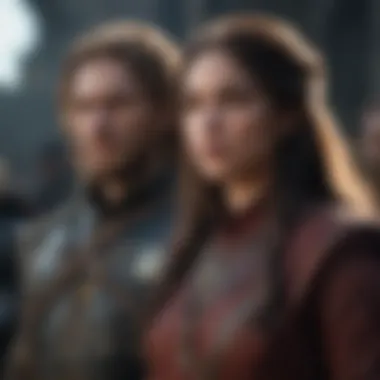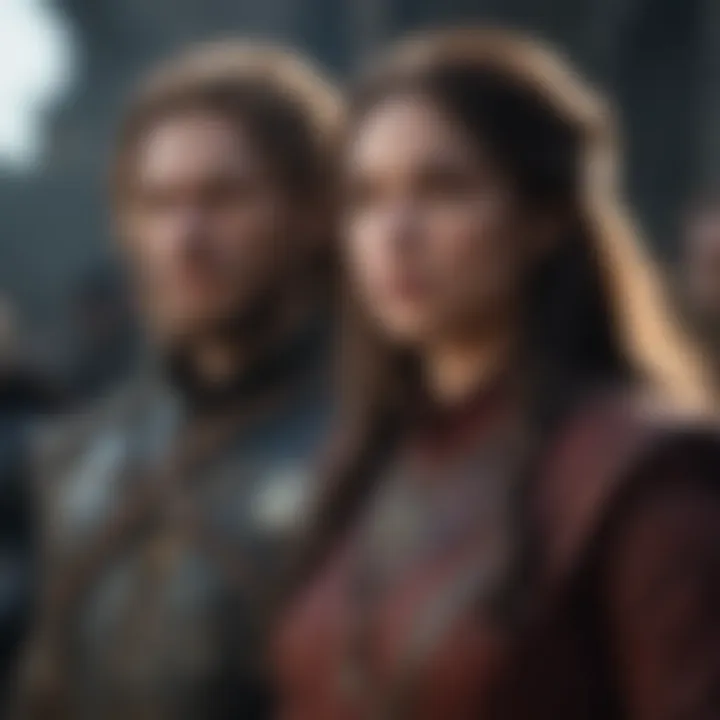Dream Prophecy in Game of Thrones: An In-Depth Exploration


Intro
Dream prophecy is a central motif within the narrative landscapes of Game of Thrones. It intertwines with character motivations, enriching the complex tale of power and ambition in Westeros. These prophetic dreams often act as harbingers of fate, foreshadowing events that unfold as the series progresses. Understanding their significance can illuminate character arcs and critical plot developments. The exploration of dream prophecy provides an essential lens through which one can grasp the themes and destiny that permeate the story.
Character Dissections
Analyzing Key Characters
Dream prophecy serves as a revealing facet in the development of several characters. For instance, Daenerys Targaryen experiences visions that guide her decisions and hint at her path towards power. The flames she sees not only signify her fatal attraction to fire but also symbolize rebirth and transformation – key themes in her journey.
Another character, Jon Snow, encounters prophetic dreams connected to his ancestral lineage. These dreams influence his decisions, particularly concerning loyalty and identity. The revelation of his heritage ultimately shapes the fate of Westeros.
Character Development and Destiny
The evolving characters are deeply affected by their prophetic dreams. Arya Stark’s nightmares reflect her battle against fear and loss, influencing her quest for revenge. Her dreams forge a crucial aspect of her identity, propelling her into becoming an accomplished assassin.
Tyrion Lannister’s dreams often showcase his internal struggles. The conflicts he faces are mirrored in his subconscious, enhancing the audience's understanding of his clever but tormented character. The dreams provide insights that help to reveal his motivations and reactions throughout the series.
Impact on the Overarching Storyline
Dreams are not mere reflections of the present; they often shape future events in the story. Prophetic fragments serve as foreshadowing tools, subtly directing characters towards their destinies. Notably, visions experienced by Bran Stark play pivotal roles in shaping the course of the war against the dead. These instances emphasize the interconnectedness of dreams and predestined outcomes.
"Dreams can be a path to understanding our fate."
The visions in the series depict how the characters grapple with their fears and aspirations, reinforcing the pervasive theme of fate versus free will. This tension enriches the narrative and prompts viewers to reflect on destiny's role in their lives.
Episode Breakdowns
Analyzing the episodes rich with dream sequences reveal the powerful thematic significance behind each vision. Specific episodes dive deep into the imaginations of characters, propelling the narrative forward.
- Significant events are often traced back to prophetic moments.
- Themes of loss, ambition, and identity resonate throughout these sequences, affecting character arcs.
- Key moments, like Daenerys's fiery awakening, showcase the consequential impact of dreams on her claim to the Iron Throne.
The symbolic content of these dreams enhances the layers of storytelling in Game of Thrones. Look closely, and one can see how these seemingly ephemeral visions create ripples in the narrative pond, shaping the paths characters take.
Lore Explorations
To fully appreciate dream prophecy, one must explore the rich lore of Westeros. The history and mythology surrounding dreams add depth to the narrative.
- Historical context provides background on characters’ relationships with prophecy.
- Hidden details in legends and folklores can link to character experiences.
- Cultural aspects, such as the belief in dreams as omens, deepen the audience's understanding of the world.
Overall, the roots of dream prophecy in Westeros’s lore invite viewers to think critically about how these narratives play into the characters' journeys.
Fan Theories
Engagement with the fan community reveals a plethora of theories surrounding dream prophecies. Fans often speculate about the implications of certain dreams for future plot developments.
- Compilation of theories highlights intriguing connections within the story.
- Evaluation based on textual evidence from episodes adds validity to these theories.
- Speculating on future storylines ignites conversations about possibilities and outcomes.
These fan theories embody a significant aspect of the Game of Thrones experience. Readers and viewers alike may find enjoyment in dissecting these prophecies, pondering what they may hint at for the characters they have grown to love or loathe.
By analyzing dream prophecy in this series, one engages with the intricate dance between fate and choice, a theme that resonates profoundly throughout the intricate narrative of Game of Thrones.
Understanding Dream Prophecy
Dream prophecy serves as a potent narrative device within Game of Thrones. It allows writers to intertwine the elements of fate and free will, mandate and destiny, imparting layers of complexity to the characters and the overall storyline. These prophetic dreams push characters to make critical decisions or lead them through significant transformations. Understanding this thematic aspect is essential for grasping how individuals navigate their roles within the chaotic environment of Westeros.
Definition of Dream Prophecy
Dream prophecy can be defined as the phenomenon where dreams reveal foresight, potential outcomes, or guidance about future events. In the context of Game of Thrones, characters experience dreams that foretell their fates or highlight hidden truths about themselves and others. Such dreams often unfold symbols or metaphorical representations, acting as forecasts that influence character actions and narrative developments.
By using dreams as prophetic tools, the series fosters tension and intrigue, prompting viewers to ponder over their meaning while considering the actions of key players in the story.
Historical Context of Prophetic Dreams
Prophetic dreams are not unique to Game of Thrones but have a deep-rooted presence in mythology, religion, and literature throughout human history. Many cultures held the belief that dreams held significant meanings, often interpreted as messages from the divine or reflections of one's inner psyche. For example, in ancient Greek culture, dreams were considered messages from the gods, offering guidance or warnings.
In Game of Thrones, this historical context enriches the narrative and provides a foundation for understanding how prophetic dreams function. Characters like Bran Stark and Daenerys Targaryen embody this medieval belief with their experiences, creating a bridge between the ancient tradition of prophetic dreaming and the chaotic struggles amidst the fight for power in Westeros.


"In dreams, we enter a world that is entirely our own." - Albus Dumbledore
While a quote from outside the series, this sentiment reflects the autonomy and influence those dreams can wield on characters like Bran and Daenerys, deepening the connection to their journeys.
Theoretical Frameworks
In the exploration of dream prophecy within the Game of Thrones narrative, theoretical frameworks play a crucial role in understanding the underlying mechanics and character motivations behind prophetic dreams. By employing various perspectives, we can analyze the dreams not just as plot devices, but as reflections of deeper psychological, cultural, and thematic elements present in the story. This section will relate psychological perspectives and cultural significance in fantasy literature to offer a multi-dimensional view of the implications of dream prophecy.
Psychological Perspectives
Psychological perspectives provide an insightful lens to examine the characters’ subconscious through their dreams. These dreams often reveal hidden truths about the characters, including their fears, desires, and even unresolved traumas.
Freudian Analysis
Freudian analysis focuses on the theory that dreams serve as a window to the unconscious mind. This method is rooted in Freud's beliefs about repressed thoughts and unresolved conflicts. In the context of Game of Thrones, characters such as Bran Stark can be seen navigating through their subconscious, with their dreams often reflecting deep-seated anxieties.
One key characteristic of Freudian analysis is its emphasis on the symbolic nature of dreams. Each symbol can be interpreted to reveal individual psychological struggles. In this article, using Freudian analysis can help dissect how Bran's visions reflect his journey from innocence to wisdom, particularly considering his acceptance of the darker facets of himself.
Despite its rich interpretative potential, Freudian analysis can face skepticism. Critics argue that this method may be overly subjective or deterministic. Nonetheless, it remains a beneficial choice as it uncovers the complex interplay between a character’s psychological state and their actions.
Modern Psychological Interpretations
Modern psychological interpretations build on Freudian ideas by incorporating contemporary psychological theories. Here, the focus shifts to understanding how dreams shape identity and influence decision-making in characters. For instance, Daenerys Targaryen's dreams often serve as reflections of her aspirations and fears regarding power and legacy.
A key aspect of modern interpretations is the integration of cognitive and behavioral theories. These frameworks emphasize the idea that dreams help individuals process experiences and prepare for future challenges. This is relevant in the Game of Thrones context, where a character's dream can foreshadow significant future events, leading them to make pivotal choices.
One unique feature of modern psychological interpretations is their adaptability. They can account for cultural and individual variations in dream interpretation. Despite this flexibility, generalizations may still occur, limiting nuanced understanding. However, their applicability makes them a strong choice for discussing character development and motivations throughout the series.
Cultural Significance in Fantasy Literature
The cultural significance of prophetic dreams in fantasy literature cannot be overstated. Such dreams often function as narrative devices that enhance the mythological and fantastical elements within a story. In Game of Thrones, dreams transcend personal experience, linking characters to a larger cosmic order or fate.
- Connection to Mythology: Many fantasy narratives draw on mythological roots, using dreams as a means to connect characters with ancient prophecies or destinies.
- Enhancing World-Building: Dreams contribute to world-building in literature, adding layers of complexity and inviting readers to engage with the text on a more profound level.
- Navigating Moral Conundrums: Dreams often present characters with moral dilemmas, forcing them to confront their beliefs and choices which drive the narrative forward.
Understanding these cultural elements in literature amplifies our comprehension of dream prophecy in Game of Thrones, enriching the reader's experience by linking personal struggles to larger existential themes.
Prominent Instances of Dream Prophecy
In the narrative of Game of Thrones, dream prophecy serves as a fundamental device that shapes characters and plotlines. It reflects character inner dilemmas and highlights crucial themes within the series. By examining specific instances of dream prophecy, we can uncover deeper meanings behind character actions and the overarching story of Westeros. The analysis of these dreams grants insight into how characters perceive destiny, power, and identity.
Bran Stark's Dreams
Three-Eyed Raven Visions
Bran Stark's experiences with the Three-Eyed Raven constitute a significant aspect of his character arc. His visions offer him a broader understanding of time and events surrounding him. This ability to see past, present, and potential futures allows Bran to confront his role in the conflict, making him both a participant and observer in the unfolding saga. The key characteristic of these visions is their non-linear nature; they enable Bran to process information away from traditional storytelling methods.
This non-linear perspective is a beneficial choice for exploring themes of fate and free will within the series. The unique feature of Bran's visions is their fragmented imagery, often symbolic and ambiguous. This complexity enables readers to interpret the information in various ways. One disadvantage might be that some audiences find it challenging to grasp the significance of Bran's glimpses. Nevertheless, they enrich the narrative, providing necessary context for the unfolding power struggles.
Implications for the North
The implications of Bran's dreams extend well beyond his personal journey. His visions signify the looming conflicts in the North, illustrating the growing threat from the White Walkers. The key characteristic here is that Bran's understanding, derived from his prophetic dreams, becomes crucial for the survival of his people. Recognizing this aspect is vital for the audience to appreciate the foreshadowing of dire consequences.
Additionally, Bran's role as a metaphorical bridge between the North's past and future becomes apparent. The unique feature of his insights enables the northern houses to prepare for the approaching war, reinforcing communal bonds. However, the reliance on a single character's visions also creates tension, as it centralizes power and knowledge in a being that struggles with his humanity.
Daenerys Targaryen's Dream Sequences
House of the Undying
Daenerys Targaryen's encounter in the House of the Undying is a pivotal moment filled with symbolic imagery. The dreams Dany experiences provide layers of meaning and reflection on her identity and purpose. The key characteristic is the blurring of past, present, and future, as the visions reveal her Targaryen lineage and the weight it carries. This is an important aspect that informs her decisions throughout the series.
The visions serve as a popular choice for exploring themes of legacy. It evokes critical insights into her internal struggles, allowing readers to understand her motivations more. The unique feature of these dream sequences is their intricate design, offering glimpses into what was, what is, and what may yet come. This complexity fosters speculation among fans and encourages deeper engagement with the text. However, the abstract nature of these dreams may obscure their meanings for some viewers, leading to split interpretations.
Foreshadowing Events
Dany's dream sequences act as instruments of foreshadowing, laying groundwork for future events. Her dreams highlight impending challenges and pivotal moments in her journey toward power. The key characteristic here is that they connect Dany’s aspirations with harsh realities, establishing her as a multi-dimensional character grappling with fate.
The unique feature of this foreshadowing lies in its ability to create suspense. As viewers see elements of her future play out through dreams, tension builds. This also invites engagement with thematic concerns related to power and its consequences. However, since foreshadowing can lead to oversaturation of expectation, it may also detract from the narrative’s spontaneity if audiences become overly focused on predictions.
Ned Stark's Prophetic Vision


Ned Stark’s prophetic vision serves a distinct role that contrasts sharply with the more fantastical dreams of other characters. His vision hints at the moral complexities and heavy burdens of leadership. This aspect underlines the consequences of honor and the failures of noble intentions, which are central to the series.
The key characteristic of Ned’s vision is its grounded realism, reflecting his character's values while also encapsulating tragedy. The somber tone of his prophetic moment allows viewers to engage with the ethical dimensions of the struggle for power. This presentation is crucial for highlighting the stark realities of Westeros.
Ultimately, these visions act as a foundation for exploring character decisions and their fallouts. This direct linkage provides audiences with a sobering reflection on actions and repercussions. The challenge lies in balancing the tragic elements without overwhelming the narrative, ensuring that the story remains rich and engaging.
Themes Emerging from Dream Prophecy
Dream prophecy serves as a pivotal element in the narrative of Game of Thrones, weaving complex layers into character arcs and overarching themes. This device not only advances the plot but also deepens the reader's or viewer's understanding of the moral dilemmas faced by the characters. Within this context, three primary themes emerge from the exploration of dream prophecy: fate versus free will, the nature of power, and transformation and identity.
Fate versus Free Will
The theme of fate versus free will is a recurring motif throughout the series, underscored by various prophetic dreams experienced by key characters. Characters like Bran Stark and Daenerys Targaryen are presented with visions that seem to predict their futures. However, these prophecies do not come without ambiguity. For instance, Bran's visions often suggest that he is destined for greater things, yet the exact nature and path of his fate remain uncertain. This interplay raises critical questions about whether characters are merely pawns of destiny or if they actively shape their own outcomes.
This thematic discussion encourages contemplation about the extent of human agency. Are Bran's actions influenced by his dreams, or does he retain the capacity to choose his path? The rich narrative suggests that the characters continuously grapple with the limitations and possibilities imposed by both their visions and their choices, reflecting the deeper philosophical discourse on freedom and predetermination.
The Nature of Power
Another crucial theme that arises from the prophetic dreams is the nature of power. In Game of Thrones, dreams often forecast not just events but also the acquisition and exercise of power. Daenerys Targaryen's visit to the House of the Undying reveals powerful images of the consequences of using her dragons, highlighting the link between power and vision.
The dreams also expose the corrupting nature of power. Various characters are shown to be driven by their quests for influence, with dream sequences acting as warnings of the potential downfall that power can bring. The concept of power in this context is not merely physical force, but also psychological influence and the burdens of leadership.
Transformation and Identity
Transformation and identity are intertwined themes that emerge prominently through dream prophecy. As characters experience visions, they often undergo significant changes in their identities. Bran Stark, for example, evolves from a naive boy into a deep thinker burdened with knowledge and responsibility. His dreams act as catalysts for his growth, forcing him to confront who he is versus who he is destined to become.
Similarly, Daenerys's journey is inextricably tied to her visions. Her dreams contribute to her understanding of herself and her legacy as a Targaryen. Each prophetic dream she encounters serves as a mirror, reflecting her changing identity and the external forces shaping her choices. The exploration of identity is crucial for both character development and long-term narrative arcs.
"The visions are not merely reflections of the future, but mirrors of the characters' internal struggles and transformations."
In summary, the themes emerging from dream prophecy in Game of Thrones provide profound insights into the characters and their journeys. Examining fate versus free will, the nature of power, and transformation and identity reveals the intricate layering of the narrative. Readers and viewers are invited to ponder the complexities of destiny, agency, and the personal stakes involved in the quest for power.
Character Analysis through Prophetic Dreams
In the intricate tapestry of Game of Thrones, the character analysis through prophetic dreams acts as a vital lens for understanding the raw emotional currents that shape the destiny of the characters. Each prophetic dream reveals not only a glimpse into the future but also character’s innermost fears, desires, and transformative journeys. This section examines how dreams unveil the psychological evolution of key characters, such as Bran Stark and Daenerys Targaryen, elucidating their motivations and moral dilemmas.
Bran Stark's Journey
From Innocence to Wisdom
Bran Stark's journey from innocence to wisdom stands as a compelling narrative, showcasing the profound impact of prophetic dreams on his character arc. Initially, Bran represents youthful curiosity and innocence, largely unaware of the complex world around him. His dreams, particularly those tied to his role as the Three-Eyed Raven, serve as catalysts for his transformation into a figure of wisdom and understanding.
The key characteristic of this journey is how Bran’s dreams do not merely foreshadow events, instead they create a framework for his growth. As he navigates through the visions, he grapples with heavy truths about his identity and power. His prophetic experiences underline the growing burden of knowledge; this knowledge, while enlightening, also isolates him further from his family and friends.
The distinct advantage of exploring Bran's journey lies in its exploration of the weight of destiny. Unlike other characters, his wisdom is not derived from experience in the traditional sense but rather through fragments of the past and futures yet unwritten. This aspect adds layers to the narrative, allowing the audience to ponder the implications of foreknowledge. However, this also raises questions about the nature of choice and its relevance in a world rife with prophecy.
Daenerys's Evolution
Trust and Betrayal
The theme of trust and betrayal emerges vividly in Daenerys Targaryen’s evolution. Her prophetic dreams often present a dichotomy between her aspirations and the betrayals she faces along her journey. Initially, dreams of fire and blood symbolize her desire for reclaiming the Iron Throne. As her story unfolds, these images morph into stark warnings of the consequences that accompany her rise to power.
Trust is a central theme within her dreams. They reflect her struggle to differentiate allies from enemies. The key characteristic of Daenerys’s journey is her evolving trust in those around her, which is constantly challenged. From the moment she betrays her brother Viserys, to the deception surrounding her loyal supporters, each dream signals warnings about misplaced trust.
The unique aspect of her journey is the emotional resonance it carries. Daenerys is often confronted with the betrayal of those she holds dear, leading to an internal conflict that resonates deeply with the audience. It also serves as a cautionary tale about the nature of absolute power. While prophetic dreams guide her journey, they also create a haunting backdrop illustrating the price of her choices. Thus, Daenerys's narrative is a poignant exploration of how belief in one's ideals can lead to devastating consequences.
The Role of Madness
Targaryen Legacy
The Targaryen legacy is woven deeply into the fabric of madness represented throughout the series, particularly as illustrated through prophetic dreams. Characters like Daenerys struggle with their inherited madness, reflected in their visions of past and potential futures of violence and chaos. This demonstrates not just a familial curse, but also a broader commentary on the cyclical nature of power and the propensity for corruption.
A significant element of this theme is the tension between ambition and sanity. The Targaryen legacy encapsulates the tragic dichotomy of greatness and madness. The key characteristic of this narrative thread lies in how characters interpret their dreams. For instance, Daenerys grapples with the weight of her ancestry, often questioning whether she is destined for greatness or madness. Her dreams serve as a constant reminder of those who have come before her, often leading to paranoia and self-doubt.
The unique feature of this narrative aspect is its exploration of moral and ethical boundaries. The dreams of madness provoke a conversation about the cost of ambition. While the Targaryens are often associated with power and dragons, their connection to madness adds depth, creating an engaging tension that enriches individual character arcs. This aspect invites the audience to ponder the thin line between vision and delusion, ambition and insanity.
"Sanity is a relative concept shaped by the world around us, and in Westeros, the dreams tell a story of fragile minds in pursuit of power."


Understanding the complexities of characters through their prophetic dreams presents an intriguing angle in recognizing the emotional and psychological constructs at play in Game of Thrones. Each character's journey is laden with prophetic significance, pushing the boundaries of their destinies.
Narrative Techniques Involving Dream Prophecy
Narrative techniques play a crucial role in how dream prophecy is presented in the Game of Thrones series. The inclusion of prophetic dreams and visions adds a unique layer to storytelling, allowing for deeper character insights and elaborate world-building. These techniques help to enhance the themes of fate, power, and identity that are central to the narrative. Moreover, they create suspense and ignite curiosity among viewers regarding how these dreams will unfold in the plot. Understanding these techniques is essential to grasp how dreams drive the story forward and shape the destinies of key characters.
Foreshadowing through Dreams
One of the most vital narrative techniques is the use of foreshadowing through dreams. Prophetic dreams often hint at future events, creating an intricate tapestry of causality and consequence. For instance, Bran Stark's visions frequently allude to significant occurrences before they happen. These dreams tease revelations and sets an expectation for viewers, compelling them to reflect upon the implications of what they see.
Such foreshadowing serves multiple purposes. It allows the audience to engage in speculative thinking, connecting various narrative threads throughout the series. Additionally, it emphasizes the themes of determinism versus free will by showcasing characters struggling to alter the fate suggested by their dreams. This tension is further seen in Daenerys Targaryen's visions, which foreshadow her ascent and the resulting turmoil.
Unresolved dreams, too, create a sense of anticipation. They linger in the audience's mind, often becoming important focal points as the story progresses. The key is recognizing the subtlety with which these foreshadowing elements are woven into the narrative. As viewers remain attuned to the appearances of prophetic dreams, they also become more engaged in the plot's development.
Disruption of Narrative Flow
Another noteworthy narrative technique is the disruption of narrative flow through dream sequences. Dreams in Game of Thrones often interrupt the linear progression of the plot, providing glimpses into characters’ psyches and their emotional states. This technique can shift the pacing of a scene, allowing depth and complexity that standard dialogues often lack.
For example, when Ned Stark has a dream about his dead brother Brandon, it reveals his lingering regrets and emotions tied to his past. The intrusion of dreams into the narrative allows the showrunners to explore backstory and character motivations without the traditional exposition. As a result, the audience gains deeper insights into their struggles and fears.
Moreover, these disruptions encourage viewers to pay keen attention to the characters’ inner lives. The fragmentation caused by dream sequences also reflects the chaotic reality of Westeros, where characters are often lost between their desires and responsibilities. This technique underscores not just individual experiences, but also the broader themes around conflict and choice.
"Dreams offer a window into the subconscious, revealing truths that daylight often conceals."
Comparative Analysis with Historical Correlations
The theme of dream prophecy in Game of Thrones is not just a narrative device; it is deeply intertwined with historical context and mythological significance. This section aims to explore how the dream sequences correlate with ancient myths and real historical events. By drawing these comparisons, we can gain insights into the broader implications of dream prophecy within the narrative. These connections point to recurring themes of fate, power, and identity, revealing the depth of George R.R. Martin's storytelling.
Mythological References
Greek and Roman Sources
In both Greek and Roman traditions, prophetic dreams played a crucial role in guiding characters and influencing decisions. For instance, in Homer's Iliad, the dream sent to Agamemnon serves as a motivator for battle, showcasing how dreams can be interpreted as divine tools. Similarly, in Roman literature, Virgil's Aeneid includes dreams that provide essential prophetic knowledge.
The primary characteristic of these sources is the emphasis on destiny and divine intervention. This aligns closely with how dream prophecies function in Game of Thrones. The connection is beneficial because it highlights the archetypal influences on Martin's work. One unique feature of these mythological references is their moral ambiguity. Greek and Roman sources often depict gods as capricious, making the interpretation of dreams complex. This complexity is mirrored in the moral dilemmas faced by characters in Game of Thrones. However, while these ancient sources often rely on fate as an unchangeable force, Game of Thrones presents characters who actively grapple with their destinies, showing that while dreams may guide, actions ultimately define outcomes.
Real Historical Events
Apart from mythological references, George R.R. Martin often draws inspiration from real historical events, which reinforces the narrative's richness. Dream prophecy links to events such as the War of the Roses, where claims to thrones, betrayal, and ambition ruled. Characters like Ned Stark and Daenerys Targaryen reflect historical figures, and their dreams serve as echoes of historical motivations and the complexity of human nature. The portrayal of dreams as guiding forces helps to contextualize these historical events within the fabric of the narrative.
This connection to historical events adds a layer of realism to the storytelling. Readers can draw parallels between the dream sequences and actual occurrences in history, making the fictional world feel more plausible. The examination of dream prophecies alongside real events shows how history often influences individual fate.
In summary, comparing dream prophecy in Game of Thrones with both mythological references and historical events reinforces the significance of these prophecies within the narrative. This exploration allows for a deeper understanding of the themes of fate and power, presenting a layered experience for viewers.
Implications for the Future of Westeros
The implications of dream prophecy in Game of Thrones extend far beyond individual character destinies; they shape the overall trajectory of Westeros itself. The intricacies of prophetic dreams influence not only the decisions of pivotal characters but also the broader narrative landscape. As dreams unfold, they set the stage for potential conflicts and alliances, establishing a framework through which the audience can understand the complexities of fate and free will in a world where power dynamics shift constantly.
Understanding the role of dreams creates an opportunity to explore unresolved narrative threads. Characters such as Bran Stark and Daenerys Targaryen experience vivid dreams that often hint at events yet to come or truths yet to be uncovered. These unresolved dreams not only serve to build suspense but also to elicit curiosity about the unknown paths ahead. As viewers connect these dream sequences to potential future events, they are prompted to consider how past traumas and decisions might echo into the future.
"The future is already written, but dreams can illuminate the dark corners where the truth hides."
Dreams allow insight into the characters’ psyches and motivations leading to the unfolding of new chapters in the lives of already established figures.
Speculation on Unresolved Dreams
Unresolved dreams within the narrative often create fertile ground for speculation. Characters like Bran present visions that are rich with indirect meanings and layered implications. As Bran's experiences with the Three-Eyed Raven illustrate, dreams can be fragmentary and difficult to interpret. This ambiguity invites viewers to ponder what messages lie beneath the surface of these prophetic occurrences.
Taking Bran's vision of the Night King into account, possible theories about the ultimate confrontation can arise. It opens up questions about the prophecy's accuracy and whether it serves as a deterministic force or merely a glimpse of possibility. The extent of influence these dreams have is paramount for the audience's understanding of future events in Westeros.
Long-Term Effects on Character Arcs
The long-term effects of dream prophecy on character arcs are significant. Take Daenerys Targaryen, for instance, whose dream sequences in the House of the Undying evoke meaningful insights into her path towards power and the sacrifices needed to attain her goals. The imagery of fire, dragons, and her lost loved ones provides a window into the depth of her character's journey. Each dream shapes her decisions and relationships, influencing the eventual trajectory of her reign.
Additionally, Ned Stark's prophetic vision provides insight into the challenges that lay ahead for his family. His experiences reveal a layered understanding of loyalty, honor, and the fragility of life. Such dreams add layers to character development, showing growth or decline over time.
Ending
Dream prophecy serves as a critical element in the narrative structure of Game of Thrones. It is not merely a narrative device, but a profound commentary on the nature of fate, choice, and consequence. Throughout the series, prophetic dreams illuminate the paths characters may take, while simultaneously heightening the viewer's understanding of their motivations and fears. This multifaceted layer of storytelling enriches the overall plot.
Recap of Key Insights
As we dissected the realms of dream prophecy, several key insights emerged:
- Dreams as Foreshadowing: The recurring theme of prophetic dreams subtly hints at future events, allowing audiences to interpret and anticipate outcomes. This interplay between predictability and surprise enhances the engagement of the viewer.
- Character Development: Dreams serve to catalyze character growth. For instance, Bran Stark’s journey from innocence to wisdom is largely influenced by his visions. These experiences shape him into a more complex entity, reinforcing the importance of personal evolution in response to challenges.
- Themes of Fate and Power: The examination of dreams contributes to overarching themes in the series. It raises questions about agency, control, and the actual nature of power. Characters grapple with their destinies, often leading to tragic or transformative endings.



